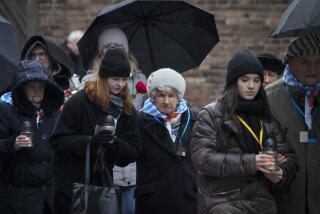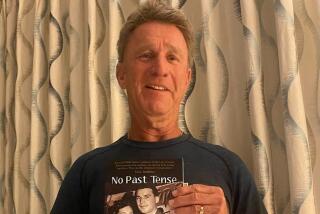BURBANK : Recounting Memories of the Holocaust
- Share via
By the time Joe Guttman, 57, had reached the age of the middle school students gathered in front of him Tuesday, he had gone into hiding in an orphanage in Hungary, lost uncles and cousins to the gas chambers and narrowly escaped death more times than he can remember.
“I have seen more killing than I hope any of you ever see on just the TV,” Guttman told the crowd of seventh- and eighth-graders at St. Francis Xavier School, a private Catholic school in Burbank.
The students had assembled to hear Guttman recount his experiences of the Holocaust, as part of Burbank’s monthlong “Days of Remembrance,” commemorating the 50th anniversary of the liberation of the Nazi death camps.
Throughout the city, in programs sponsored by the Burbank Human Relations Council, speakers ranging from Holocaust survivors to American soldiers who liberated the concentration camps are discussing their experiences this month.
At St. Francis Xavier, Guttman, a jovial man who is now an electrician and contractor, recounted his memories as a young boy in Budapest.
The Nazis, he said, gradually took away the rights of the Jewish people--restricting the hours they could be outside, requiring them to wear yellow stars, expelling the children from school and, finally, forcing them to go into hiding.
Guttman told the students that the stars they were forced to wear were yellow because that color represented cowardice. “Call me a coward. I was 5 years old,” Guttman said. He added: “You had to wear them because if you were caught without it you were automatically executed. They didn’t care how old you were.”
He passed around to the students a photograph of his family--his mother, father and five brothers and three sisters, all except one of the brothers wearing the yellow star. He said his immediate family is one of the largest to have come out of the Holocaust without a single member dying.
To a quiet, at times stunned, audience, Guttman recounted walking over dead bodies and parts of bodies in the streets of Budapest and seeing the Danube overflow with the bodies of children six months after the war ended.
Guttman and several of his brothers and sisters escaped the Nazis by hiding in an orphanage, he said. On Christmas Eve, 1944, the orphanage held a Christmas party to throw off any Nazis who suspected Jewish children might be hiding there.
He recalled hearing the sound of trucks pulling up to the orphanage that night.
“When you saw empty trucks with just a few soldiers, you knew what they were coming for,” he said. But just as the trucks pulled up, the children heard shooting. The Russian army had come to save them.
Guttman said that just hours before the trucks arrived, the Nazis had rounded up 500 children from a neighboring orphanage and executed them.
But Guttman said he is not filled with hate, that he just wants people to remember the Holocaust. “Jews forgive, but they do not forget,” he said.
Seventh-grader Eric Flores, 13, said he learned things at the talk that he normally wouldn’t have found in a textbook. “I should give them respect, for what they went through and for talking to other people about it.”
Ayme Coronado, 12, said that in class, the students have read books about the Holocaust and seen films about the concentration camps. “We’ve studied it. But not details that were so graphic . . . It’s not like the videos,” Ayme said.
RICARDO DeARATANHA / Los Angeles Times
More to Read
Sign up for Essential California
The most important California stories and recommendations in your inbox every morning.
You may occasionally receive promotional content from the Los Angeles Times.













